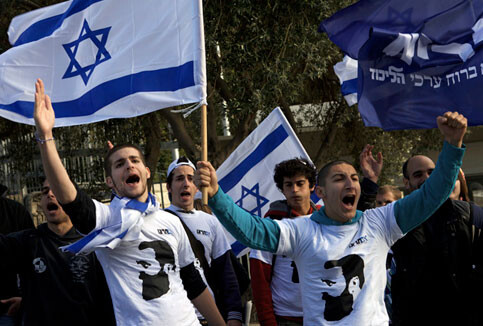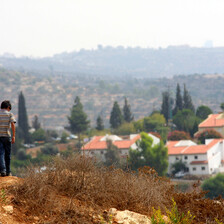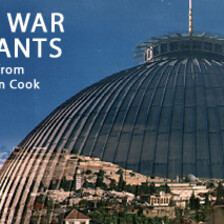The Electronic Intifada 15 April 2010

Israel has gone out of its way in recent months to goad the Palestinians into confrontation. (Anne Paq/ActiveStills)
The headlines were ablaze last week after the Palestinian Authority (PA) announced that it would build the new presidential compound on a street named after Yahya Ayyash. Ayyash, whose nickname was “The Engineer,” was a Hamas military commander who orchestrated several attacks against Israeli civilian targets in the mid-1990s in response to the 1994 massacre of Palestinian worshipers at Hebron’s Ibrahimi mosque by an Israeli-American settler named Baruch Goldstein. In 1996, Ayyash was assassinated by Israel in Gaza City.
“This is a shocking incitement to terrorism by the Palestinian Authority,” boomed Israeli Prime Minister Benjamin Netanyahu in a statement. “Arch-terrorist Ayyash,” as Netanyahu called him, had “murdered hundreds of innocent Israeli men, women and children,” and so building the presidential compound on this street was an act of “wild incitement by the Palestinians for terror and against peace.” The United States reacted with strong support for the Israeli position. “Honoring terrorists who have murdered innocent civilians, either by official statements or by the dedication of public places, hurts peace efforts and must end,” State Department spokesman P.J. Crowley said.
The hysterical reaction of the Israeli government, and US support for it, is hardly surprising. Of note however is the double-standard exhibited by Israel and its patron, the US. The assumption throughout is that Israel’s actions are just, defensive and in pursuit of peace for all. Conversely, Palestinian actions are aggressive and evil, and worthy of worldwide condemnation. The strength of this narrative allows the US and Israeli governments to make the construction of a new government building on a street whose name Israel disproves of into a major incident, worthy of outrage and international condemnation, while grotesque Israeli crimes and far more flagrant provocations go unquestioned.
A Jerusalem Post editorial headlined “Glorifying Terrorism” exemplifies this point. The “inescapable message is that such crimes are the PA’s ideal,” the editorial stated, since it “acclaims malevolence instead of denouncing it.” The Jerusalem Post declared that the act was “an affront to the very notion of coexistence,” and yet another example of the PA’s “consistent policy” of “deception” and “insincerity” which has undermined “the Oslo promise.” “Our misfortune,” The Jerusalem Post lamented, “is that the world’s outrage is very selective and very misplaced.”
That such manufactured outrage could be delivered without a hint of irony is startling in light of recent events. This includes a series of internationally-condemned deliberate Israeli provocations — supported by Washington — in reaction to the UN-commissioned Goldstone report.
Investigated and published in the wake of Israel’s invasion of Gaza last winter, the Goldstone report documents the deliberate targeting of civilians, including the “systematically reckless” use of white phosphorous, showering densely-populated and impoverished refugee camps with the burning chemical, resulting in horrific burns and death. It also describes deliberate Israeli attacks on mosques, hospitals, schools, ambulances, UN facilities and indiscriminate bombardment of crowded slums. “You feel like an infantile little kid with a magnifying glass looking at ants, burning them,” one Israeli soldier said of the attack, which killed more than 1,300 Palestinians and left thousands more injured, mutilated and homeless.
In a shocking example of “acclaiming malevolence instead of denouncing it,” the US and Israel have attacked the report relentlessly and attempted to marginalize it, and Israel has refused to even conduct a credible investigation into its findings. While concerned citizens in cities around the world took to the streets to express their anger at the horrific atrocities documented in the report, the US called it “unbalanced” and “flawed” and moved to block its consideration at the UN, promising to veto any action in the Security Council if necessary. Likewise, Israeli President Shimon Peres referred to the report as “a mockery.” The US and Israel then pressured PA President Mahmoud Abbas to defer action on the report in the General Assembly (though overwhelming popular pressure later forced him to reverse that position).
Israel has gone out of its way in recent months to goad the Palestinians into confrontation, including naming two places deep in the West Bank “Israeli Heritage Sites,” sparking days of protests. Israel has also escalated its provocations around the al-Aqsa Mosque in Jerusalem, the third holiest site in Islam. Along with the Dome of the Rock, the mosque sits inside the Haram al-Sharif, which is known as the Temple Mount to Jews. In addition to repeatedly deploying soldiers around the compound, Israel has announced that it will expand the Jewish prayer area at the Western Wall, despite a Jerusalem court’s decision that such a move would violate the status quo agreement that has governed Jerusalem’s holy sites since Israel seized the Old City in the June 1967 War.
A further escalation was the reopening of the “Hurva,” a Jewish synagogue just a few hundred meters from the al-Aqsa Mosque. With growing numbers of Jewish fundamentalists insisting that they be allowed to pray inside the Haram al-Sharif, many of whom advocate demolishing the al-Aqsa Mosque and building a third Jewish temple in its place, the reopening was universally condemned in the Muslim and Arab world. It was also reported in the Israeli press that according to a 300-year-old rabbinical prophecy, the reopening of the synagogue foretold the construction of the third temple in the place now occupied by the al-Aqsa Mosque. Yet when Palestinian leaders called for a “day of rage” in response to these provocations, the US sharply criticized them for overreacting. Yet only weeks later, Israel opened another synagogue in East Jerusalem 100 meters closer to the Haram, and Washington was silent.
Despite all this, the Israeli and American governments jointly denounce the Palestinians’ choice of which street on which to construct a new presidential palace as “wild incitement.” Are the Palestinians allowed to be outraged when Israel names streets, every inch of which lie on land that was taken from them, after the commanders that masterminded and executed the cleansing of 70 percent of Palestinian Arabs in 1948? What would the consequences be if Mahmoud Abbas started referring to Defense Minister Ehud Barak, who presided over a campaign that “punished and terrorized” the 1.5 million residents of Gaza last winter as an “arch-terrorist”?
Given recent Israeli provocations, and the American response to them, the operative principle is clear: the Israelis are justly defending their democracy, while the Palestinians are savage, uncompromising terrorists. Those fighting for justice and peace in the Middle East must relentlessly confront this narrative, spreading truth and awareness, the only basis on which the conflict can finally come to an end.
Stephen Maher is an MA candidate at American University School of International Service who has lived in the West Bank, and is currently writing his Masters’ thesis, “The New Nakba: Oslo and the End of Palestine,” on the Israel-Palestine conflict. His work has appeared in Extra!, The Electronic Intifada, ZNet and other publications. His blog is www.rationalmanifesto.blogspot.com.





